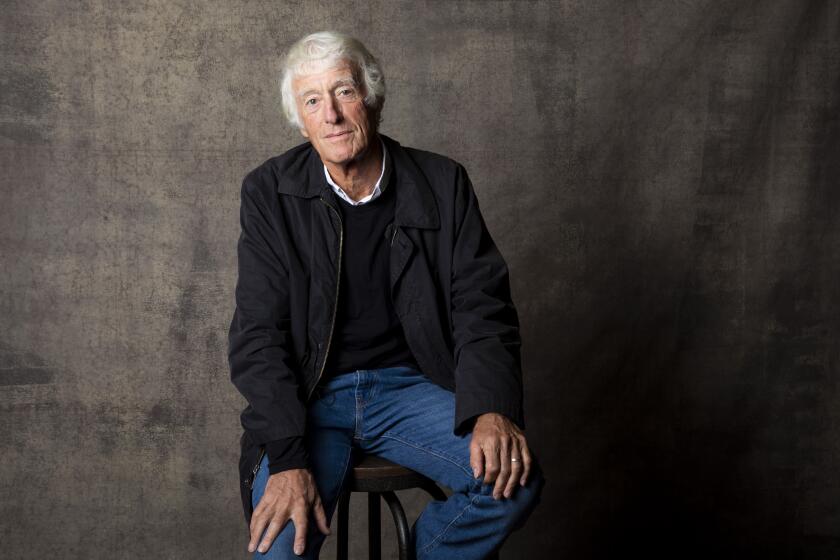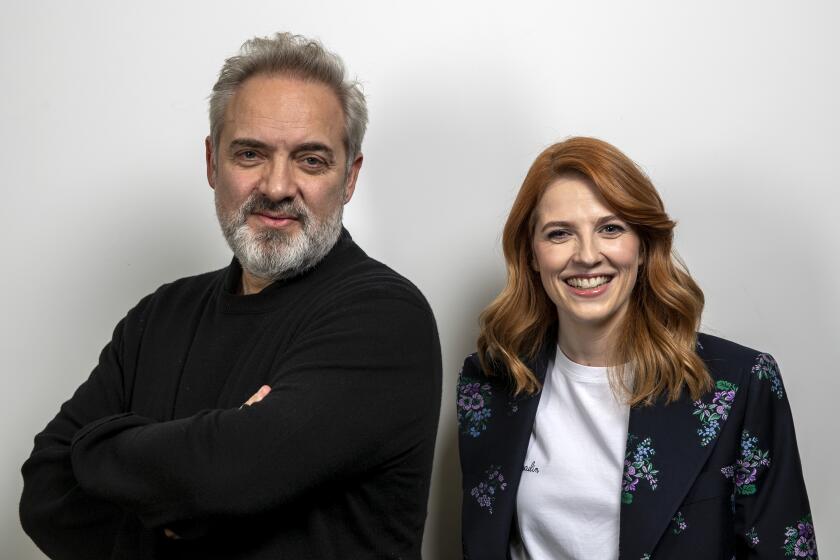Composer Thomas Newman’s ‘1917’ score plays as an opera for both nerves and emotion
- Share via
There’s an anecdote about Alfred Newman, the veteran film composer and longtime head of music at 20th Century Fox, when Alfred Hitchcock was questioning the realism of having a musical score in his 1944 film “Lifeboat.”
“You’re in the middle of the ocean, Alfred,” Hitchcock supposedly said. “Where does the orchestra come from?” “The same place the camera came from,” Newman replied.
The composer’s son, Thomas Newman, faced a similar dilemma on “1917.” Sam Mendes’ World War I movie was shot and edited to appear as one long, uninterrupted take; Roger Deakins’ camera hurtles viewers along on a hyper-visceral, you-are-there journey through exploding battlefields and treacherous trenches for two breathless hours.
The World War I film ‘1917’ presents its action in seeming real time, with the fluid camera movements always connecting to the characters on a mission
So where does the orchestra come from?
“If you see his stage plays,” Newman said of Mendes, “typically music plays a big role. So I think he likes it, which is obviously a great thing, as a musician, to be around.”
For this film, Mendes said he didn’t want to “pile gloom on gloom” as his characters are sent on a perilous mission to deliver a message, recalled Newman. “So the question was: How could you make justifiable contrast? I think we treated it just more in a notion of landscapes through which the characters would travel — most of the time — as opposed to the characters themselves.”
Newman and Mendes have collaborated on seven films, ever since “American Beauty” in 1999. They started discussing “1917” last November.
The primary challenge, Newman said, was that “you wouldn’t be able to use [film] cuts as transitions. So the big issue was: When would music go away? Why would it go away? And when would it come back? If the camera continued to just kind of rove around, why were things changing [musically], and when were they changing?”
The film is a relentless exercise in tension and release, and Newman had to vary the pulse and style of musical suspense and action so that there would be an evolving but cohesive arc to the score.
Oscar winner Sam Mendes and co-writer (and “history nerd”) Krysty Wilson-Cairns got into the trenches for “1917,” an immersive World War I quest movie.
Fortunately, he earned a degree in action scoring by doing Mendes’ two James Bond films, “Skyfall” and “Spectre.”
“I definitely grew muscles on the Bond movies,” he said. “I’d done some action sequences in some of the Pixar movies, but I’d never scored an action movie before ‘Skyfall.’ There may be less a chance to speak as an individual, as opposed to speak as a required composer trying to make something more exciting. So action writing can limit one’s ability to be expressive, and that’s a good lesson to learn, I think.”
But Newman’s score for “1917” is an opera for both nerves and emotion. Amid the racing electronic heartbeats and jittery percussion are passages of serene, reflective beauty. Quiet character moments are scored with the composer’s trademark wispy woodwind lines and a gentle, worried motif for keyboards.
When a major tragedy occurs midway through the film, Newman wrote some tender music for the character of Lance Cpl. Schofield (George MacKay) that was “quite moving,” but Mendes rejected that approach.
“He wanted the starkness and the coldness of that moment,” Newman said. “And I think he was right. He wanted to delay that emotion, you know, eight or 10 minutes until [Schofield] got into the truck, and that was a moment of reflection there for him.”
The “delayed emotion” comes in the form of a lyrical lament for solo cello, which Newman later reprises at the end of the film with rich catharsis.
As verité as the movie often feels, it welcomed big emotions and big music in certain places — partly because “there’s something slightly mythic about it, and epic,” Newman said.
One of the most striking visuals is a nighttime vista of bright fires lighting up the ruins of a French village. Newman’s score goes full operatic, with strings spiraling up and down the spine of a mysterious chord inside a massive cathedral of orchestral sound.
“Sam really wanted that to be a musically driven moment,” Newman said. “I must have written five or six ideas — I’d had pretty good ideas, and Sam would like 60% or 70%. But it never took him where he needed it to go, until I came up with the idea that’s in the movie. There were just a couple of moments in the movie where music gets ahead of drama, and that’s certainly one of them.”
The big climax is a six-minute sprint, darting through the fray to deliver the vital message.
“Sam just always knew that there had to be a sense of imminent ... ‘success’ would be the wrong word, but that he was going to make it,” said Newman. “That the odds were great, and yes, it was suspenseful, but that there had to be in the music the sense that this was going to happen, that this was meant to happen.”
He recorded that six-minute cue ... in one take.

The trailer for Sam Mendes’ intense World War I odyssey, “1917.”
More to Read
Only good movies
Get the Indie Focus newsletter, Mark Olsen's weekly guide to the world of cinema.
You may occasionally receive promotional content from the Los Angeles Times.












